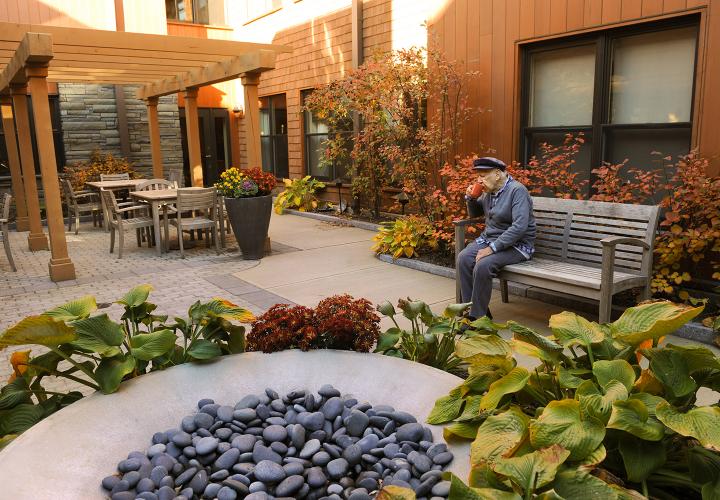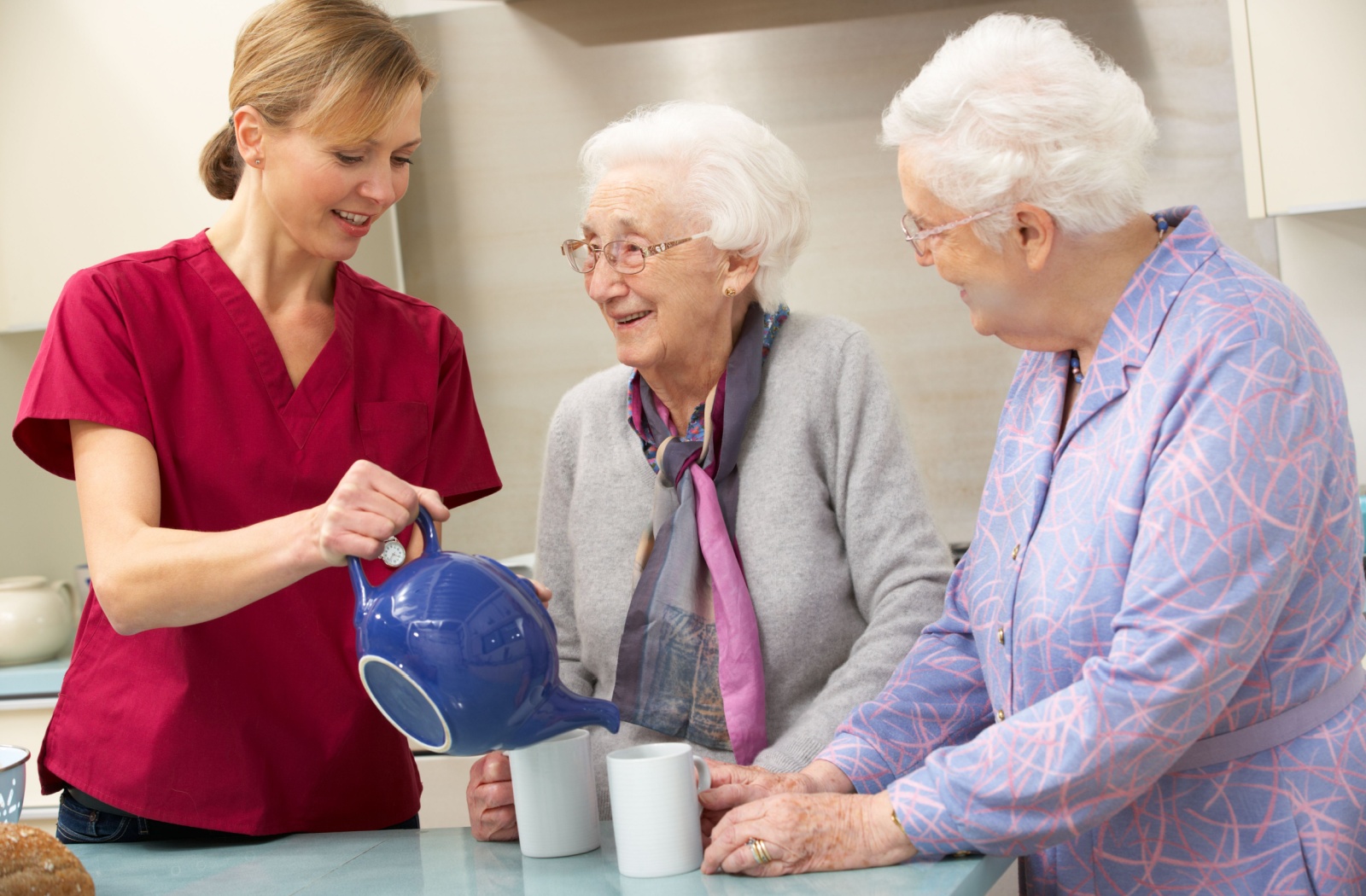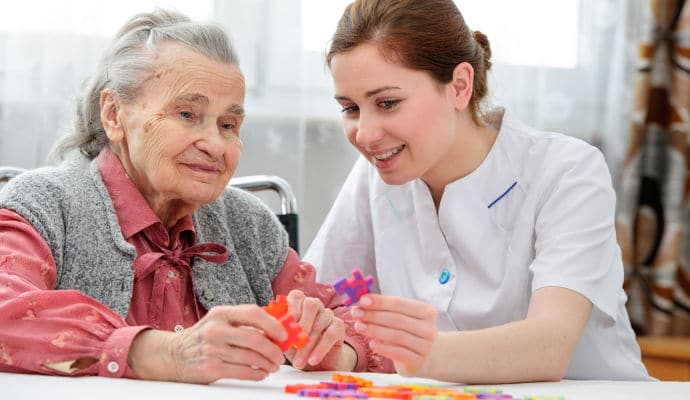Developing a Safe and Helpful Atmosphere for Alzheimer's Care
The creation of a secure and encouraging atmosphere for people with Alzheimer's is extremely important in improving their quality of life. This involves not just physical adaptations within the home, such as decreasing risks and incorporating familiar components, however also the application of structured routines and meaningful tasks that accommodate their cognitive demands. Recognizing the emotional and emotional measurements of treatment can considerably affect their feeling of security and link. Discovering these multifaceted techniques can disclose essential insights into reliable caregiving approaches that may transform the everyday experiences of both patients and caregivers.
Comprehending Alzheimer's Requirements
Often, individuals with Alzheimer's disease display a series of requirements that need tailored methods to care. As the problem proceeds, cognitive decrease shows up in numerous methods, affecting memory, thinking, and also the capacity to do everyday activities. Caregivers must identify these progressing demands to supply appropriate support and guarantee a higher quality of life for those impacted.
One important aspect of understanding Alzheimer's requirements is recognizing the value of regular and knowledge. People usually find convenience in recognized patterns, which can decrease anxiousness and complication. Caregivers must strive to produce structured daily schedules that incorporate significant activities aligned with the person's capabilities and rate of interests.
Additionally, efficient interaction is paramount. People with Alzheimer's might struggle to express themselves or comprehend complex language. Caretakers ought to use basic, clear language, use non-verbal hints, and technique energetic paying attention to foster understanding and connection.
Caretakers need to urge engagement in community activities or household events, promoting a feeling of belonging and purpose. Comprehending these diverse requirements is essential for developing a helpful treatment setting.
Creating a Safe Home
Developing a safe home for individuals with Alzheimer's condition is necessary to decreasing risks and advertising independence. Make certain that pathways are well-lit and clear, as appropriate lighting minimizes disorientation and enhances flexibility.
Including flexible features is additionally important. Mount grab bars in shower rooms and near stairs, and consider using non-slip floor coverings in damp areas. In addition, making use of different shades for floorings and walls can aid in identifying rooms, helping to minimize confusion.
Knowledge is necessary for people with Alzheimer's. Customizing the setting with familiar objects and pictures can strengthen a sense of belonging and security - Alzheimers Care Charlotte. It is additionally beneficial to have actually a marked area for everyday tasks, such as reading or crafting, which can supply structure to their day
Finally, applying a protected exterior room permits for risk-free expedition while linking with nature. By thoughtfully creating the home setting, caregivers can significantly enhance the high quality of life for people coping with Alzheimer's disease.
Enhancing Communication Abilities

Non-verbal communication, including faces, motions, and touch, plays a critical function in communicating empathy and understanding. Preserving eye contact and a calm disposition can enhance the convenience level of the individual, promoting a sense of safety and security.
In addition, it is necessary to practice energetic listening. This entails being fully existing, showing perseverance, and allowing the individual to express themselves without interruption. Repeating may be needed; caretakers need to be prepared to review subjects or questions, as individuals with Alzheimer's may deal with memory recall.
Additionally, utilizing aesthetic aids or cues, such as photos or familiar items, can facilitate acknowledgment and interaction. Inevitably, improving communication skills is regarding building trust and producing an environment where individuals feel listened to, valued, and comprehended, thereby enriching their lifestyle.
Encouraging Social Interaction
Fostering significant social communications can substantially boost the well-being of people with Alzheimer's illness. Involving with others not just helps combat view it now feelings of seclusion but likewise boosts cognitive feature and emotional health. Structured social activities, such as group arts, crafts and video games, or music therapy, produce chances for homeowners to attach with peers and caregivers, which can cause boosted state of mind and reduced stress and anxiety.
Producing a welcoming setting that encourages socialization is crucial. This can be attained by arranging common areas that promote communication, such as cozy seating areas or task rooms. Additionally, including acquainted and culturally pertinent activities can motivate and stimulate memories involvement, enabling individuals with Alzheimer's to feel more connected to their previous experiences.
Moreover, caregivers ought to be trained to acknowledge and promote social engagement among residents. Basic gestures, such as initiating conversation or helping with little seminar, can help people really feel valued and great post to read included. Regularly arranged gatherings need to correspond yet versatile, fitting varying degrees of capability and rate of interest. By prioritizing social interaction, we can significantly improve the lives of those dealing with Alzheimer's, cultivating a feeling of neighborhood and belonging.
Sustaining Caregiver Well-being

To support caretakers, companies should provide routine training and instructional resources to improve their understanding of Alzheimer's illness and caregiving techniques. Offering accessibility to reprieve treatment solutions permits caregivers to take necessary breaks, decreasing anxiety and exhaustion - Alzheimers Care Charlotte. In addition, fostering a community through support system can assist in psychological sharing and the exchange of sensible advice among caregivers, producing a network of shared assistance
Psychological health and wellness sources, such as counseling solutions, can additionally be vital in dealing with the emotional toll caregiving can take. By prioritizing caregiver well-being, we create a more sustainable caregiving atmosphere that not only benefits the caretakers themselves yet also improves the overall high quality of care gotten by individuals with Alzheimer's. Inevitably, sustaining caretakers is an essential component in cultivating a efficient and thoughtful treatment setting.
Conclusion
To conclude, the production of a encouraging and risk-free atmosphere for individuals with Alzheimer's is vital to enhancing their top quality of life. By focusing on safety through thoughtful style, fostering psychological wellness with familiar components, and promoting engagement via structured routines, caretakers can dramatically affect the overall experience of those influenced by this condition. Moreover, supporting caregiver well-being is crucial, as it inevitably adds to a much more effective and thoughtful care setting.
Rep may be essential; caregivers need to be prepared to review concerns or subjects, as individuals with Alzheimer's might battle with memory recall.
